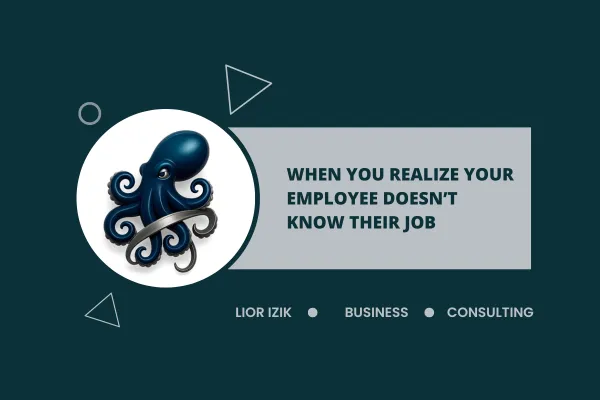
When You Realize Your Employee Doesn’t Know Their Job
When You Realize Your Employee Doesn’t Know Their Job…
How honesty in hiring builds stronger, more productive teams.
From time to time, I meet business owners or managers who discover something uncomfortable — they have employees who, frankly, don’t know what they’re doing.
And here’s the kicker: those people weren’t hired as interns.
They were hired as employees — people you expected to handle their responsibilities with confidence and skill.
At first, everything looks fine. The new hire walks in with confidence, speaks like they know what they’re doing, and carries themselves like a pro. But after a few weeks or months, cracks start to show — missed details, repeated mistakes, and a growing sense that this person might not fully understand their role.
The Manager’s Dilemma
That’s usually the point where a manager starts to rationalize.
They think:
“Well, I already hired this person. Maybe I’ll just teach them what they don’t know.”
And while that might seem like the kind or patient approach, it’s often the start of a much bigger problem.
Because here’s the truth: once you decide to keep someone who isn’t qualified for their position, you’re not fixing one problem — you’re creating three more.
You slow down your team’s performance.
You frustrate your top employees.
You lower your company’s standards.
By trying to save one weak hire, you risk losing the strong ones.
Why I Value Honesty Over Confidence
When I hire, I don’t expect people to know everything.
What I expect is honesty.
If a candidate comes to me and says,
“I know A, B, and C — but D? I’m not sure.”
I respect that.
Now, I know what I’m getting into. I can decide whether D is something I can teach — and I make that decision fully aware of the risk.
That’s transparency.
That’s professionalism.
It’s far better to hire someone who knows their limits than someone who pretends to be an expert and wastes everyone’s time figuring it out later.
When “Fake It Till You Make It” Backfires
When a person lies about their skills, it doesn’t just hurt them — it hurts the entire organization.
Projects get delayed.
Colleagues spend extra hours covering for them.
And leadership gets distracted trying to fix problems that shouldn’t exist in the first place.
Most of the time, it ends one of two ways:
The employee gets released once their performance issues pile up.
Or they quit after learning the profession from your team, taking their new experience somewhere else.
Either way, your business loses — time, energy, and trust.
My Hiring Philosophy
I like to work with people who actually know what they’re doing.
When we bring in experienced, capable individuals, something amazing happens — they’re operational within days.
They don’t need micromanagement.
They don’t need reminders.
They just get it.
And sometimes, the best ones look at our systems and say,
“Hey, here’s something you could improve.”
That’s when I know we made the right hire.
Because they’re not just following instructions — they’re contributing ideas.
Even when I don’t always agree with their suggestions, I appreciate their initiative. It means they care about the business, not just their paycheck.
What This Means for You
If you want to build a strong, resilient team, stop hiring people who “say” they know what they’re doing.
Start hiring people who really do.
Look for honesty.
Look for self-awareness.
Look for competence backed by results, not just confidence in an interview.
When you build your company around professionals who are truthful about their strengths and weaknesses, you get more than just productivity — you gettrust.
And trust is what keeps your business growing, even when challenges come.
Final Thought
So if you ever find yourself wondering whether to keep someone who clearly isn’t ready for their role, remember this:
Training can fix gaps in skill — but it can’t fix dishonesty.
Hire people who are serious about what they do, who tell you the truth, and who bring real value from day one.
That’s how you build teams that don’t just survive — theylead.
Created by Lior Izik Consulting